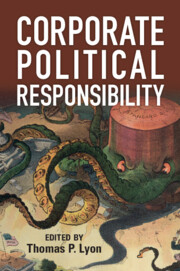Book contents
- Corporate Political Responsibility
- Reviews
- Corporate Political Responsibility
- Copyright page
- Contents
- Figures
- Tables
- Contributors
- Preface
- Section I Foundations of Corporate Political Responsibility: Metrics for Disclosure and Good Governance
- Section II Transparency: Causes and Consequences
- 4 What Drives Firms to Disclose Their Political Activity?
- 5 Promise and Peril
- Section III Accountability: Linking Corporate Social Responsibility, Employee Relations, and Corporate Political Responsibility
- Section IV Responsibility: Corporate Political Responsibility and Climate
- Section V Implementing Corporate Political Responsibility: Opportunities and Challenges
- Index
- References
4 - What Drives Firms to Disclose Their Political Activity?
from Section II - Transparency: Causes and Consequences
Published online by Cambridge University Press: 16 November 2023
- Corporate Political Responsibility
- Reviews
- Corporate Political Responsibility
- Copyright page
- Contents
- Figures
- Tables
- Contributors
- Preface
- Section I Foundations of Corporate Political Responsibility: Metrics for Disclosure and Good Governance
- Section II Transparency: Causes and Consequences
- 4 What Drives Firms to Disclose Their Political Activity?
- 5 Promise and Peril
- Section III Accountability: Linking Corporate Social Responsibility, Employee Relations, and Corporate Political Responsibility
- Section IV Responsibility: Corporate Political Responsibility and Climate
- Section V Implementing Corporate Political Responsibility: Opportunities and Challenges
- Index
- References
Summary
Given growing worry about dark money electoral spending and covert forms of business lobbying – neither of which generally require federal reporting – a shareholder-activist movement has emerged to pressure companies to increase their voluntary political disclosures. This chapter investigates how companies are pressured for greater disclosure and how they respond. I find that firms are likely to be targeted if they are larger and more prominent, and engage in higher levels of conventional lobbying and electoral spending. Additional qualitative evidence shows that targeting follows from a firm’s receptivity to engagement and also if their spending appears contradictory to corporate values. Lastly, I investigate the likelihood that shareholder activism is successful, finding that apparent concessions are more likely after repeated targeting and during years of S&P 500 index constituency. The chapter draws conclusions about the prospects for greater transparency of corporate political expenditures in a time of uncertain government oversight.
Keywords
- Type
- Chapter
- Information
- Corporate Political Responsibility , pp. 101 - 123Publisher: Cambridge University PressPrint publication year: 2023



